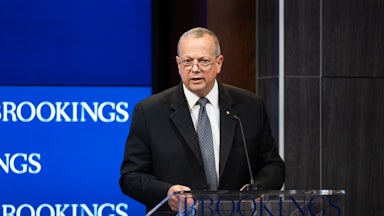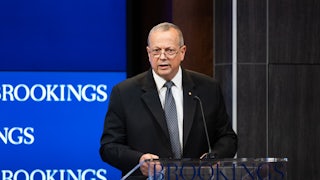At some point over the past few years, the Biden administration revoked one of the few progressive policies that Trump-era officials implemented in the effort to bring greater transparency to foreign influence in Washington. The New Republic has learned that with little fanfare, and with even less explanation, the White House has stopped requesting that American think tanks disclose funding from foreign governments. “This is not the policy of the U.S. State Department,” an agency spokesperson said last month.
The policy initially emerged in 2020, when then–Secretary of State Mike Pompeo announced that the State Department would finally request that think tanks “disclose prominently on their websites funding they receive from foreign governments, including state-owned or state-operated subsidiary entities.” As Pompeo continued, “The unique role of think tanks in the conduct of foreign affairs makes transparency regarding foreign funding more important than ever.” He added that State Department staff would “be mindful of whether disclosure has been made.”
It was a move that didn’t generate much publicity outside of Washington but promised to provide unprecedented insight into which foreign regimes were funding American think tanks and what those regimes may have been receiving in return. But under the Biden administration, that request is no more.
Officials did not respond to further questions about when or why this policy was revoked. But it is a clear blow to those calling for greater transparency in the key policymaking vehicles in Washington—and it is a clear reprieve for think tanks reliant on these kinds of foreign funds—especially those that receive such boodle from dictatorial regimes around the world.
And if the scant reporting on the topic is any evidence, this kind of financing has only become more and more commonplace in Washington. As one 2014 article from The New York Times reported, foreign dictatorships had learned how to “buy influence” via think tank donations and then use those well-greased wheels to capitalize on the connections the think tanks maintain in Washington.
It’s not hard to see why foreign regimes enjoy bankrolling American think tanks. For instance, such organizations are able to avoid the extant regulatory apparatus and its tools, such as the Foreign Agents Registration Act, or FARA, which requires foreign lobbyists to disclose their payments and activities. Moreover, these think tanks further provide an imprimatur of supposed objectivity—meaning that dictatorships can launder their reputations, and affect American policy, more easily than they could using paid-for lobbyists elsewhere.
While some think tanks disclose certain details about foreign funding, few of them reveal the specific amounts received or the details of any contracts or agreements reached. And now, thanks to the Biden administration’s move, the United States has taken a clear step back—and opened the door once more for foreign regimes flooding these think tanks with their lucre.
American think tanks aren’t merely bankrolled by friendly, democratic nations. Dictatorships like Azerbaijan and Kazakhstan have all directed significant funds toward America’s leading think tanks, splurging millions on the organizations crafting policy for American legislators. More recently, leading Russian kleptocrats have been connected to America’s leading think tanks, with groups like the Council on Foreign Relations keeping Russia’s wealthiest oligarch—a “close associate” of Vladimir Putin, and one now sanctioned by the U.S.—on its board even after Russia’s expanded invasion of Ukraine last year. Just last year, The New Republic covered the ongoing scandal of the president of the Brookings Institution acting as a cutout for Qatari interests—all after Brookings accepted millions and millions of dollars from Qatar’s dictatorship.
But as detailed in a forthcoming report from the Human Rights Foundation, no regime has perfected the art of transforming American think tanks into lobbying vehicles as well as the United Arab Emirates. As part of a far broader political influence and interference playbook, the UAE’s brutal dictatorship has, on an annual basis, funneled millions of dollars into America’s leading think tanks. In fact, the UAE is not just the single largest dictatorial donor to American think tanks, it is now the single largest foreign benefactor overall for a number of these groups.
Not only did the UAE provide the majority of all foreign funding for think tanks like the Aspen Institute—a group that claims to be “committed to realizing a free, just, and equitable society”—but it has further donated significant sums to groups like Brookings. Most impressively, according to the most recent analysis, the UAE is also the largest foreign donor to the Atlantic Council, which remains arguably America’s most prominent think tank focused on foreign policy.
Despite claiming that its “commitment to fundamental ... values” includes “democracy” and “individual rights”—neither of which the UAE maintains—the Atlantic Council has nonetheless accepted millions from the dictatorship, outpacing donations from democracies like the U.K. or Sweden. The Atlantic Council does not reveal how much money it accepts from the UAE, but the funds are apparently sufficient to land the Emirati dictatorship among the organization’s highest ranks of donors—the only dictatorship to do so.
It’s clear that the UAE—which has been linked to, among other things, torture camps and funding Russian mercenaries—didn’t pursue such donations out of some kind of benevolence. As one examination of foreign funding of U.S. think tanks found, the “Atlantic Council’s ties to the UAE have given the UAE the opportunity to shape the think tank’s reports prior to publication,” effectively allowing the dictatorship to craft the Atlantic Council’s supposedly independent analysis before release. As leaked emails showed, Atlantic Council officials directly reached out to their UAE patrons with offers to edit their text, including material that “was to be published under the name of” David Petraeus, one of America’s best-known former military officers.
Nor is that all. In early 2023, CNBC published an op-ed from Atlantic Council President Frederick Kempe, praising the UAE’s selection as the host for the United Nations’ upcoming Climate Change Conference (known as COP 28). As Kempe wrote, the appointment of Sultan Al Jaber, the CEO of the UAE’s Abu Dhabi National Oil Company, was “the ideal choice.” However, Kempe failed to add any disclosures about the UAE’s relationship with the Atlantic Council—a blinding oversight, considering the substantial sums the Atlantic Council has accepted from the dictatorship. CNBC soon issued an editor’s note on Kempe’s article, describing the relationship between the UAE and the Atlantic Council as an “obvious conflict of interest,” which Kempe never bothered to disclose to CNBC before publication.
To be fair to the Atlantic Council, other think tanks have happily gorged themselves on the UAE’s loot as well. By the late 2010s, the UAE had become one of the top donors for the Center for American Progress—a nominally liberal think tank, linked closely with the Democratic Party. Following the UAE’s funding, which ran into the millions of dollars, a member of the think tank’s staff began helping Emirati officials “organize UAE-sponsored trips” to the country and began directly advising Emirati officials on how to lobby their American counterparts.
Meanwhile, the Washington-based Middle East Institute remains largely reliant on funding from the UAE; according to its most recent disclosures, the UAE remains far and away the think tank’s largest donor, a status it has retained for years. The relationship culminated in a “secret $20 million gift” that the UAE provided for the Middle East Institute, which the think tank did not disclose.
Over and over again, American think tanks have accepted Emirati funding and then proceeded to obscure their relationship with the dictatorship. The only reason we know of these donations, and of the effects these donations had on the think tanks in question, was due to the remarkable work of investigative journalists and researchers, who spent untold hours trying to pry information from these opaque think tanks. And again, this is just what’s managed to come out thus far. But now, thanks to the Biden administration’s move, that opacity has only increased. Suddenly, think tanks are once more a black box for foreign funding—one that dictatorships, if past is any precedent, will be eager to exploit to their own nefarious ends.










